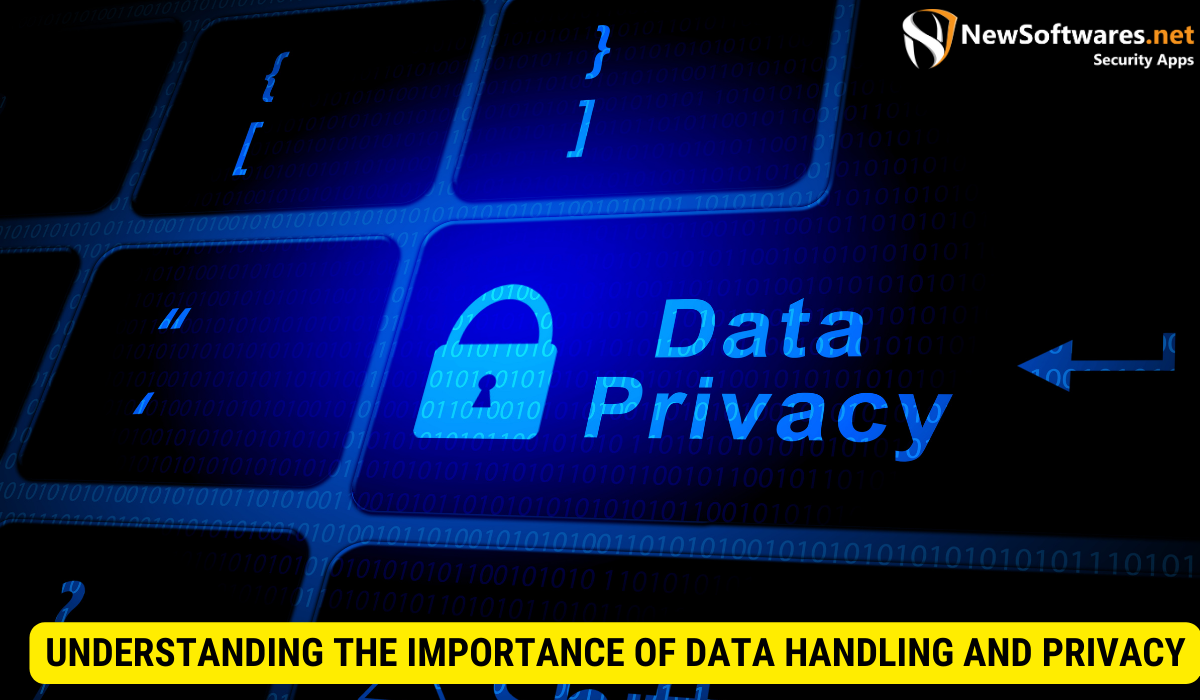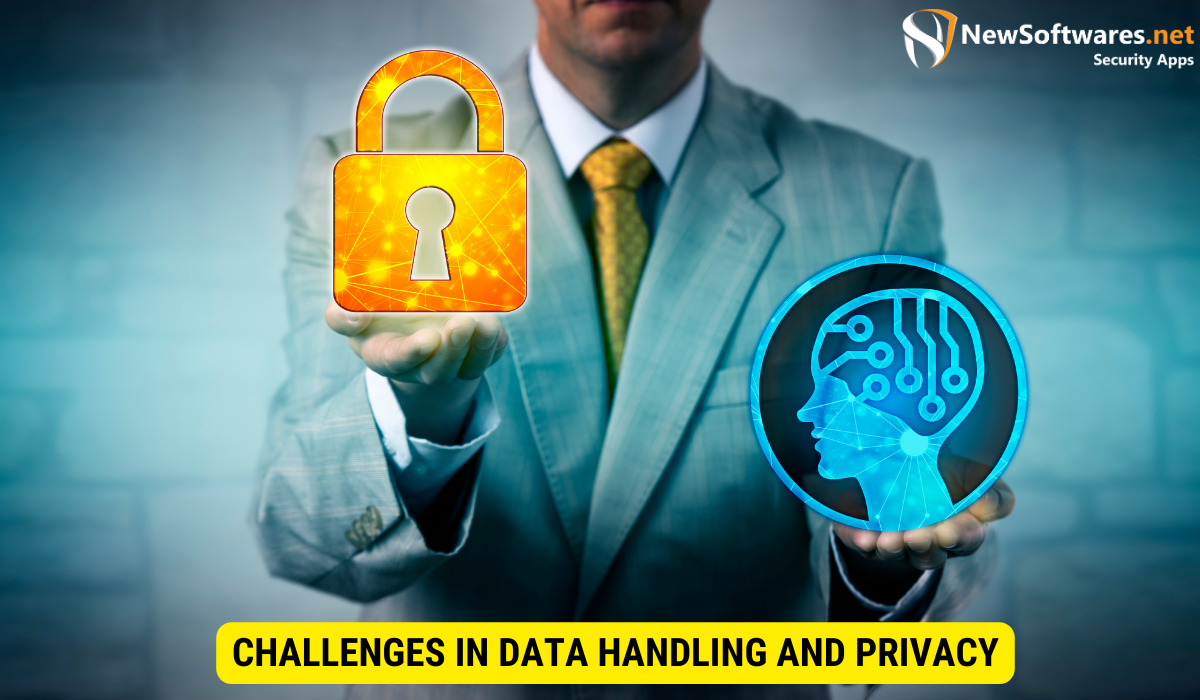The golden rule of data handling and privacy is the fundamental principle that guides organizations and individuals in effectively managing and protecting sensitive information. In an era where data breaches and privacy concerns are becoming increasingly prevalent, it has become crucial to understand and adhere to this golden rule to ensure the safety and security of data.
Understanding the Importance of Data Handling and Privacy

Data handling involves the collection, processing, storage, and sharing of data, while privacy refers to the ability to control and protect personal information. These concepts are essential in today’s digital age, where vast amounts of data are created and exchanged daily. Proper data handling and privacy measures are necessary not only to comply with legal and regulatory requirements but also to establish trust among individuals and organizations.
Defining Data Handling and Privacy
Data handling encompasses various activities, including data collection, analysis, storage, and disposal. It involves ensuring data accuracy, relevance, and accessibility while minimizing risks associated with data breaches and unauthorized access. Effective data handling also includes implementing data governance frameworks, such as data classification and data lifecycle management, to ensure that data is appropriately managed throughout its lifespan.
Privacy, on the other hand, focuses on safeguarding personal information by implementing proper consent mechanisms, data anonymization, and security measures to prevent unauthorized disclosure or misuse. It involves understanding and complying with privacy laws and regulations, such as the California Consumer Privacy Act (CCPA) and the Health Insurance Portability and Accountability Act (HIPAA), which provide guidelines on how personal information should be handled and protected.
Why is Data Handling and Privacy Crucial?
Data handling and privacy are crucial for several reasons. Firstly, individuals have the right to privacy and expect their personal information to be treated with utmost confidentiality. Organizations that respect privacy rights build trust and credibility with their customers and stakeholders. By implementing robust privacy practices, organizations can demonstrate their commitment to protecting personal information, which can enhance their reputation and attract more customers.
Secondly, mishandling of data can lead to significant financial and reputational consequences for organizations. Data breaches can result in legal liabilities, loss of customer trust, and damage to brand reputation. The costs associated with data breaches, including legal fees, notification expenses, and potential fines, can be substantial. Therefore, organizations must invest in robust data handling practices and security measures to prevent data breaches and protect sensitive information.
Furthermore, data handling and privacy are essential for compliance with laws and regulations. For example, the European Union’s General Data Protection Regulation (GDPR) imposes strict obligations on organizations regarding data protection. Non-compliance with GDPR can result in severe penalties, including fines of up to 4% of annual global turnover or €20 million, whichever is higher. By prioritizing data handling and privacy, organizations can ensure compliance with relevant laws and regulations, mitigating the risk of legal consequences.
In conclusion, data handling and privacy are critical aspects of today’s digital landscape. Organizations must prioritize these areas to protect personal information, build trust with customers, and comply with legal and regulatory requirements. By implementing robust data handling practices, organizations can mitigate the risks associated with data breaches and unauthorized access, ensuring the confidentiality, integrity, and availability of data. Additionally, organizations that prioritize privacy can enhance their reputation and attract more customers, ultimately contributing to their long-term success.
The Golden Rule of Data Handling and Privacy
The golden rule of data handling and privacy revolves around the fundamental principle: treat data as you would like your own information to be treated. Applying this rule involves adopting ethical practices, implementing proper security measures, and respecting individual rights and freedoms when handling and processing data.
Exploring the Concept of the Golden Rule
The concept of the golden rule in data handling involves recognizing the inherent value and sensitivity of data and treating it with the utmost care and respect. It means adopting privacy-by-design principles, ensuring transparency in data practices, and obtaining informed consent from individuals when collecting and processing their data.
Application of the Golden Rule in Data Handling and Privacy
The application of the golden rule requires organizations to implement sound data handling and privacy practices. This includes securing data through encryption and access controls, regularly monitoring and auditing systems for vulnerabilities, and establishing policies and procedures that prioritize data protection. Organizations should also provide individuals with easily accessible information about how their data is being used and give them control over their data through options such as data deletion and opting out of certain data processing activities.
Principles of Data Handling
Data handling principles serve as guidelines for organizations to ensure responsible and ethical handling of data. Some key principles include:
Data Minimization and Purpose Limitation
Data minimization involves collecting and retaining only the necessary data required to achieve a specific purpose. Organizations should define clear and legitimate purposes for data collection and processing and refrain from collecting excessive or unnecessary information.
Accuracy and Storage Limitation
Data accuracy is vital in maintaining the integrity and reliability of information. Organizations should make efforts to keep data accurate, up-to-date, and relevant. Additionally, data storage should be limited to the necessary time frame, aligning with the specific purposes for which the data was collected.
Integrity and Confidentiality in Data Handling
Ensuring the integrity and confidentiality of data involves implementing measures to prevent unauthorized access, modification, and disclosure. Organizations should employ encryption, access controls, and secure storage solutions to protect sensitive data from unauthorized individuals or entities.
Principles of Data Privacy
Data privacy principles outline the expectations and responsibilities of organizations in protecting individuals’ personal information. Some key principles include:
Transparency and Lawful Basis for Processing
Organizations should provide clear and transparent information about their data processing practices, including the purposes, legal basis, and rights of individuals. Processing personal data should always be based on a lawful and legitimate ground, such as consent, contractual necessity, or legal obligations.
Data Subject Rights and International Transfers
Data subjects have certain rights, such as the right to access, rectify, and delete their personal data. Organizations should facilitate the exercise of these rights and ensure that personal data is not transferred to countries without adequate data protection standards unless appropriate safeguards are in place.
Security Measures for Data Privacy
Organizations must implement appropriate technical and organizational measures to ensure the security of personal data. This includes measures such as data encryption, pseudonymization, regular data backups, and training employees on data protection best practices.
Challenges in Data Handling and Privacy

While data handling and privacy practices are essential, several challenges pose significant obstacles for individuals and organizations. These challenges include:
Technological Challenges
Rapid technological advancements make it challenging for organizations to keep up with evolving threats and ensure data security. New technologies, such as artificial intelligence and the Internet of Things, create complexities in data handling and privacy, requiring organizations to continuously adapt their practices.
Legal and Regulatory Challenges
Data handling and privacy regulations vary across jurisdictions, making it difficult for organizations to navigate multiple legal frameworks. Complying with different regulations, such as the GDPR, California Consumer Privacy Act (CCPA), or Brazil’s Lei Geral de Proteção de Dados (LGPD), requires significant efforts and resources.
Ethical Challenges
Data handling and privacy raise ethical considerations, particularly when organizations collect and analyze large amounts of personal data for purposes such as targeted advertising or behavior tracking. Balancing the benefits of data-driven insights with the ethical implications of infringing on individual privacy rights remains a challenge.
Key Takeaways
- Data handling and privacy are crucial for organizations to establish trust, comply with regulations, and prevent data breaches.
- The golden rule of data handling and privacy emphasizes treating data with the same care and respect that one would expect for their own information.
- Principles of data handling include data minimization, accuracy, storage limitation, integrity, and confidentiality.
- Data privacy principles focus on transparency, lawful processing, data subject rights, and security measures.
- Challenges in data handling and privacy include technological advancements, legal complexity, and ethical considerations.
FAQs
Q: What happens if an organization fails to adhere to the golden rule of data handling and privacy?
A: Failing to adhere to the golden rule can lead to severe consequences, including data breaches, legal liabilities, financial losses, and damage to reputation and trust.
Q: How can organizations ensure compliance with data handling and privacy regulations?
A: Organizations can ensure compliance by conducting regular data audits, implementing security measures, providing transparency in data practices, obtaining informed consent, and staying up-to-date with relevant regulations.
Q: What steps can individuals take to protect their privacy in the digital age?
A: Individuals can protect their privacy by being cautious with sharing personal information, using strong and unique passwords, enabling multi-factor authentication, regularly reviewing privacy settings, and being selective about the apps and services they use.
Q: Are there industry-specific guidelines or regulations for data handling and privacy?
A: Yes, certain industries have specific guidelines or regulations. For example, the healthcare sector must comply with the Health Insurance Portability and Accountability Act (HIPAA), while the financial industry follows regulations such as the Payment Card Industry Data Security Standard (PCI DSS).
Q: How can organizations promote a culture of data handling and privacy within their workforce?
A: To promote a culture of data handling and privacy, organizations should provide regular training to employees, establish clear data handling policies, designate a data protection officer, encourage reporting of potential breaches, and foster a culture of accountability and responsibility when it comes to data protection.
Q: Is data handling and privacy a one-time effort or an ongoing process?
A: Data handling and privacy are ongoing processes that require continuous monitoring, adaptation to changing technologies and threats, and adherence to evolving legal and regulatory requirements.
Conclusion
The golden rule of data handling and privacy is a fundamental ethic in the digital era, emphasizing the need for ethical practices, transparency, security, and respect for individual rights. Organizations must adopt this rule to build trust and maintain credibility, while individuals should be proactive in protecting their personal data. This principle is critical for navigating the challenges of privacy and data protection in the 21st century.
